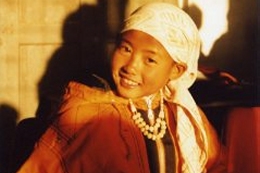The original homeland of the Lepcha people was referred to as the ‘hidden paradise’ or ‘the land of eternal purity’. The Lepcha’s are the aboriginal inhabitants of Sikkim. Lepcha is a non-tonal Tibeto-Burman language that is spoken in West Bengal India. It is also spoken in Nepal and in Bhutan. The English word ‘Lepcha’ was derived from Nepali and had a derogatory meaning ‘inarticulate speech’. Currently, the language is widely used without this connotation. The Lepcha people refer to themselves as ‘the Children of Rong and of God,’ or ‘the rong tribe.’ The word for ‘language’ in Lepcha was ‘ring’ so the Lepcha call their language ‘rongring.’
The Lepcha script was invented in the 17th or 18th century by Thikung Men Salong, who was a Lepcha scholar. He was inspired by Buddhist missionaries. The Lepcha script is known as rong. Currently, the Lepcha script is widely used to write books, newspapers, magazines, prose and plays. Lepcha is a syllabic alphabet. This means that each letter has an inherent vowel. Vowels are indicated using diacritics. Lepcha is written from left to right and there are spaces between words.
Lepcha is spoken by 65,000 people. The word ‘Lepcha’ is the name of the people as well as the name of the language. Other alternate names for Lepcha include Lapche, Rongke, Rongpa and Nunpa. There are differences in the classification of the language. While some linguists argue that it is a Himalayish language that falls under the Mahakiranti language family, other linguists classify it as a Tibeto-Kanauri family of languages or a Naga language. It predates the arrival of various Tibetan languages such as Dzongkha, Nepali and Sikkimese. There are different Lecpcha groups in India. The four distinct communities include Renjongmu, Tamsangmu, Mirik and Promu. The language is widely used by individuals of all ages in Sikkim villages. Some young generation speakers use it as their main mother tongue. It is even used as a language of instruction in some schools. Most Lepcha’s are either Christians, Hindus or Buddhists.
